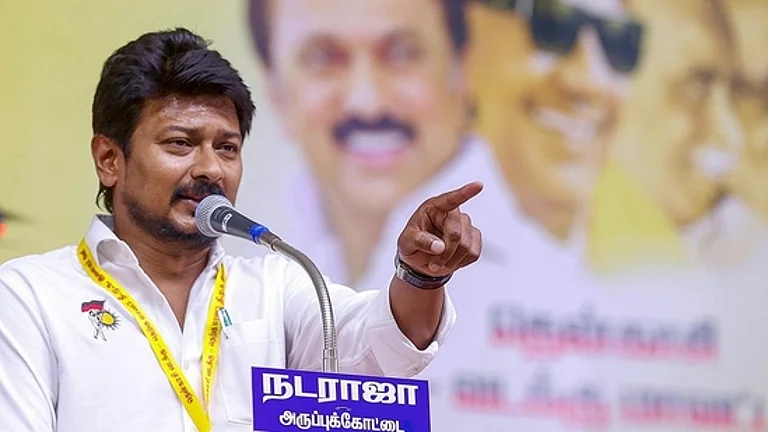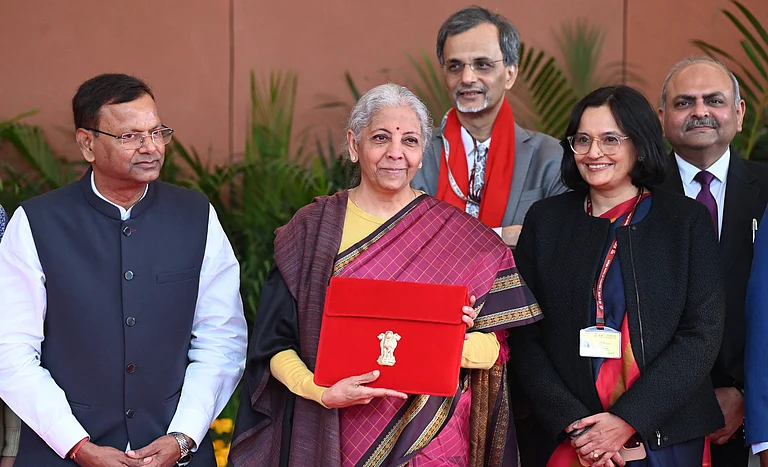Union Finance Minister Nirmala Sitharaman in Union Budget 2023-24 made a slew of announcements for farmers and the agricultural sector, ranging from setting up an agri-tech start-up fund and hiking agricultural lending to promoting alternative fertilisers.
In her Budget Speech in Parliament on Wednesday, Sitharaman mentioned farmers at the very beginning.
She said in the Budget Speech's opening paragraph, "This Budget hopes to build on the foundation laid in the previous Budget, and the blueprint drawn for India at 100. We envision a prosperous and inclusive India in which the fruits of development reach all regions and citizens, especially our youth, women, farmers, OBCs, Scheduled Castes and Scheduled Tribes."
The complete allotment to Ministry of Agriculture and Farmers Welfare in Budget 2023-24 stands at around Rs 1.15 crore against the last year's approximately Rs 1.10 lakh crore. This is a hike of around 4.6 per cent.
Sithraman also made clear the Union government's push for the production and export of millets.
Budget 2023-24 announcements for agriculture sector
1. Agriculture Accelerator Fund
Sitharaman announced the setting up of an Agriculture Accelerator Fund.
She said, "The Fund will aim at bringing innovative and affordable solutions for challenges faced by farmers. It will also bring in modern technologies to transform agricultural practices, increase productivity and profitability."
2. Cotton crop productivity enhancement
Sitharaman announced the Union government will adopt a cluster-based approach to enhance the cotton crop.
She said, "To enhance the productivity of extra-long staple cotton, we will adopt a cluster-based and value chain approach through Public Private Partnerships (PPP). This will mean collaboration between farmers, state and industry for input supplies, extension services, and market linkages."
3. Centre of excellence for millets
Highlighting the significance of millets and India's place in world's millet market, Sitharaman announced that the Indian Institute of Millet Research, Hyderabad will be made into a Centre for Excellence.
Calling millets shree anna, she said, "We are the largest producer and second largest exporter of ‘Shree Anna’ in the world...21.These have a number of health benefits, and have been an integral part of our food for centuries. I acknowledge with pride the huge service done by small farmers in contributing to the health of fellow citizens by growing these ‘Shree Anna’.
"Now to make India a global hub for 'Shree Anna', the Indian Institute of Millet Research, Hyderabad will be supported as the Centre of Excellence for sharing best practices, research and technologies at the international level."
4. Agriculture credit to be increased
Sitharaman in her Budget 2023-24 speech announced that the agriculture credit target will be increased to Rs 20 lakh crore with focus on animal husbandry, dairy, and fisheries.
5. Promotion of natural farming
Sitharaman also announced the setting up of 10,000 Bhartiya Prakritik Kheti Bio-Input Resource Centres over the next three years for natural farming.
She said, "Over the next three years, we will facilitate 1 crore farmers to adopt natural farming. For this, 10,000 Bio-Input Resource Centres will be set-up, creating a national-level distributed micro-fertilizer and pesticide manufacturing network."
6. Promotion of alternative fertlisers
Sitharaman in Budget 2023-24 also announced a new scheme to provide incentives for the adoption of alternative and natural fertilisers.
Sitharaman also announced the setting up of 500 bio-gas plants across the country.
She said, "PM Programme for Restoration, Awareness, Nourishment and Amelioration of Mother Earth will be launched to incentivise states and Union Territories to promote alternative fertilisers and balanced use of chemical fertilisers."
Announcing the GOBARdhan scheme, Sitharaman said, "Five-hundred new ‘waste to wealth’ plants under GOBARdhan (Galvanizing Organic Bio-Agro Resources Dhan) scheme will be established for promoting circular economy. These will include 200 compressed biogas (CBG) plants, including 75 plants in urban areas, and 300 community or cluster-based plants at total investment of 10,000 crore...5 per cent CBG mandate will be introduced for all organizations marketing natural and bio gas. For collection of bio-mass and distribution of bio-manure, appropriate fiscal support will be provided."
Reactions to agriculture budget
In immediate reaction to FM Sitharaman's budgetary provisions for agriculture, the markets reacted positively as fertiliser and agricultural stocks soared, according to Business Today.
"Shares of select fertiliser players including The Phosphate Company jumped around 5 per cent. Madras Fertilizers, Fertilizers and Chemicals Travancore, Pradeep Phosphates and Zuari Agro also rallied up to 4 per cent in the morning trade...Some of the agri-related players including Kaveri Seed Company traded 3.54 per cent higher at Rs 545 at around 11.55 am (IST)," reported Business Today.
Tarun Arora of IG International said the increase in credit target will help farmers and help them adopt modern farming techniques.
Arora, Director, IG International, said, "Agriculture credit target will be increased by Rs 20 lakh crore, an initiative that will benefit many of our country's farmers. It will assist them in adopting modern farming techniques. This should help to increase agricultural demand. The government intends to invest Rs 2,200 crore in high-value horticulture. This will aid in the growth of the horticulture sector by utilising technologically advanced methods that result in high-quality produce. Also, agri-production in India will be improved through the Agriculture Accelerator Fund's introduction of contemporary technology."
Anand Ramanathan of Deloitte India told Business Standard that the announcements for millets and start-up fund will help with crop diversification and increasing agricultural productivity and yield.
He said, "The increased availability of credit, facilitation of better quality inputs through a clean plant program, investments in digital infrastructure and skill development will all help in increasing farm-level productivity...The increased focus on driving millet cultivation, consumption and exports, higher investment in fisheries and promotion of natural farming are all helpful from a crop diversification, sustainability and nutrition standpoint.
"Finally, the agriculture accelerator announcement for promoting start-ups in ag-tech enterprises will help increase yield and productivity on the supply side while also enhancing price realisation for the farmer on the demand side through more efficient market linkages."
Contary to the reaction of the markets and independent experts, the Opposition dismissed the Budget 2023-24's agricultural element.
Politician Yogendra Yadav tweeted, "Expenditure on Agriculture and allied schemes (Including PM Kisan) has been slashed drastically: from 3.84% in BE 2022-23 to 3.20% in 2023-24. Perhaps the most indifferent budget ever for the farmers."
Congress leader Jairam Ramesh compared it with the last year's budget and expressed disappointment.
He tweeted, "Last year's Budget drew applause for allocation towards agriculture, health, education, MGNREGA & welfare of SCs. Today the reality is evident. Actual expenditure is substantially LOWER than budgeted. This is Modi’s OPUD strategy of headline management—Over Promise, Under Deliver."
Modi government and farmers
The farmers have been a key constituency for Prime Minister Narendra Modi as they have given his government perhaps the biggest embarrassment since 2014.
The farmers protested in Delhi for over a year, blocked roadways, and forced the Modi government to withdraw three farm laws that it had brought to liberalise the closed farming economy. The farmers protested against the introduction of free-market principles into rural and traditional farmers' economy and directed worldwide criticism to the Modi government. From Western heads of government to pop-singers and actors, the farmers gained worldwide support and forced the Modi government's surrender.
A mob during the farmers' tractor rally also went on a rampage across Delhi and vandalised the Red Fort and attacked Delhi Police personnel across the capital.
Since there are nine assembly elections in 2023 which will set the tone for the 2024 general elections, the Modi government will not want to disappoint the farmers again, which hold sway in several pockets of the country.










.jpeg?auto=format%2Ccompress&fit=max&format=webp&w=768&dpr=1.0)















